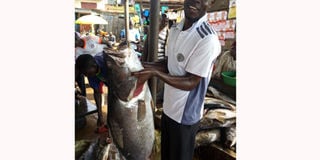Fishermen ask govt to fix price of fish maw

Mr Kadilu Wazaba carries a Nile Perch at Masese Landing Site in Walukuba-Masese, Jinja City, on August 19. PHOTO | PHILIP WAFULA
Fishermen at Masese Landing Site in Jinja City want government to regulate the price of gas bladders, following a pep talk by President Museveni on the highly sought-after fish organ.
Last month, during a televised address, Mr Museveni said: “Nile Perch can grow to 300 kilogrammes apparently and I have got a study that Ugandans can get a minimum of $150b a year from this Nile Perch.”
“Apparently, the meat of the Nile Perch is not important; it is the bladder, what they call enuni. It has got special qualities and is also expensive. A kilogramme is Shs10m and one mature Nile Perch can give you three kilogrammes; so such a bladder can get you Shs30m, equivalent to $9,000,” he said.
Also known as gas bladder, fish maw or air bladder, is found in the dorsal portion of the fish to control its buoyancy and stay at their current water depth without having to waste energy in swimming.
Mr Kadilu Wazaba, a fisherman, says because the actual price of the organ is unknown to them, they find themselves being cheated by middlemen in the supply chain.
A kilogramme, he says, goes for Shs1m; however, Mr Robert Mugoya, Mr Patrick Namage, and Mr James Ahimbisibwe, also fishermen, each said it goes for Shs1.3m, Shs900,000 and Shs800,000, respectively.
Such contradictions reveal the uncertainty with which the fishermen are operating.
The fishermen add that following Mr Museveni’s proclamation, the landing site has been flooded with middlemen, mainly from Mukono, who prowl the area for the organ, which they take to Chinese clients in Kampala.
“When the Covid-19 pandemic had just broken out in March, the demand for the organ was low because all major export countries, including China, were under lockdown and flights were grounded. At that time, a kilogramme, which usually went for Shs900, 000, was going for between Shs580,000 and Shs600,000; so those with stores had to buy, hoard and sell at exorbitant prices,” Mr Namage said.
He added: “The current problem is that despite some restrictions being eased and airspaces opened (to flights), middlemen are insisting on buying the organ cheaply and that’s why we want the government to intervene and regulate the business.”
The deputy Executive Secretary of Lake Victoria Fisheries Organisation (LVFO), Dr Anthony Taabu Munyaho, said currently, there is no law to guide this business. LVFO is a regional organisation under the East African Community that is responsible for coordinating and managing fisheries and aquaculture resources.
“This is a new business innovation that recently came and there are no law governing it. As you know, laws take time to develop but that does not mean there is nothing going on.
“As LVFO, we initiated a study that is now looking at development of guidelines for management of this very lucrative trade among East Africa partner states,” Mr Munyaho said.
He added that a consultant that was contracted, subjected them to a report which they have reviewed and is undergoing a second review, before it is shared by partner states.
Asked how much a gas bladder costs locally, Mr Munyaho said: “The price keeps changing that’s why fishermen are complaining; but a kilogramme goes for Shs500,000 and is sometimes more expensive than the fish.”
He was, however, noncommittal on the export value, saying: “We have to look at the study we did, and the consultant has some details.”
Mr Mugoya said there was reluctance from fishermen to venture into the swim bladder business; however, their curiosity was awakened after those buying them started visiting the landing site while driving ‘expensive vehicles’.
He, however, warned that the business is shrouded in mystery that if not well-taken care of can increase or deplete the investment.
“The middlemen say Chinese want a one-kilogramme organ which can only potentially be found in a Nile Perch weighing 60 kilogrammes; but such a catch may take two weeks or even up to a month to come ashore,” he said.
Their current Nile Perch catch, he says, ranges from 30 kilogrammes to 45 kilogrammes; but even when one is weighing 60 kilogrammes eventually comes, one must pray that its gas bladder makes the desired weight.
In some of the most puzzling disparities in fish size, a Nile Perch weighing 24 kilogrammes may contain a one-kilogramme swim bladder, and one weighing 60 kilogrammes posts an organ of about 700 grams, Mr Wazaba said.
Use of the organ
Speaking to Daily Monitor in October last year, Dr Robert Kayanda, the director of Fisheries and Management at LVFO, said the organ is used to make operational stitches that are used on patients in theatres and as a refining agent in the manufacture of beers and wines.
“Chinese use them in soups and is a delicacy among their community and are mainly exported to Asian markets (Hong Kong) between $250 (about Shs912,000) and $500 (about Shs1.8m) per kilogramme,” he said.




